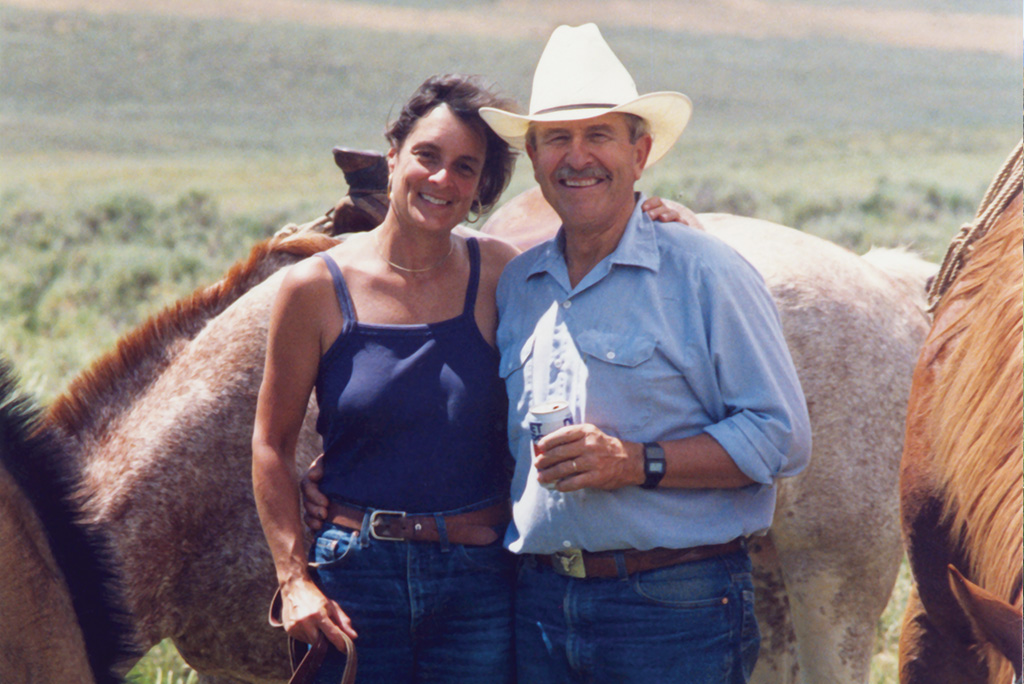Every October, nearly 25,000 people flock to the Wood River Valley in Idaho for the Trailing of the Sheep Festival. If ewe ever wanted to know how it got started, here’s the story.
In the fall of 1991, to ameliorate conflicts between the sheep and users of the newly opened bike path through the traditional sheep easement, Diane and John Peavey, owners of the Flat Top Sheep Company north of Carey, invited people to join the procession of woollies through the Wood River Valley. The Peaveys entertained participants with sheep ranching stories along the way.
The event grew yearly, and by 1996, the Peaveys and Carol Waller, then director of the Sun Valley/Ketchum Chamber and Visitor Bureau, came up with an idea: to create an event that would demonstrate the history and heritage of sheep ranching in the Valley that has contributed to local economies for generations.
Twenty-five years later, the five-day family event has grown to include a wool and food festival, storytelling, multicultural performances, championship sheepdog trials, and culinary events. On Sunday, at “the Main Event,” 1,500 sheep trail down Main Street in Ketchum in the Big Sheep Parade, migrating south to winter pastures in front of cheering audiences.
John Peavey’s grandfather, banker John Thomas, established the Flat Top Sheep Company in 1929 when he noticed sheepmen paid off their loans faster than cattlemen.
When John Peavey’s father, Art, drowned in a boating accident on the Snake River in 1941, John’s mother, Mary Thomas Peavey (later Brooks), moved her family to Washington, D.C., where her father, John Thomas, was serving in the U.S. Senate.
John Thomas died in 1945, and Mary ran the sheep outfit until 1960 when she was elected to the Idaho State Senate. In September 1969, she was appointed director of the U.S. Mint by President Nixon, a position she held until February 1977. John Peavey reflected, “She was just as much at home with ranchers as she was with U.S. Presidents.”
John Peavey was appointed to fill out Mary’s term and went on to serve 21 years in the Idaho Senate. During his time in office, John launched an initiative campaign to create Idaho’s Sunshine Law that brought campaign activities and lobbying finances into the light. He worked for new openness in government practices.
Peavey went against his party in the mid 1970s when he challenged a proposal by Idaho Power Co. to build a coal-fired plant on the Snake River. “It was a big squabble over what to do with the Snake River and whether we needed a thousand-megawatt power plant to pump, literally, all the water out of the Snake, which was going to triple our power rates,” he said. Attorney Matthew Mullaney and Peavey filed a complaint with the Idaho Public Utlities Commission (PUC) in 1977 on behalf of 32 ratepayers. “We were arguing that they didn’t need to build a thousand-megawatt power plant; all they had to do was change water policy so we could keep this water in the river producing the power that we’re using now,” Peavey said.
Completed in 2014, the Snake River Adjudication process is the largest water rights adjudication to be completed in U.S. history. Peavey reflected on part of his legacy. “It turned out to be really fortunate because Idaho is, I think, the only Western state that is not allowing the mining of our aquifers.”
John Peavey’s passion is ranching and caring for the lands that belong to Flat Top Sheep Company. It’s a family affair, with Peavey’s son Tom and his grandsons Cory and Jake now helping to run the ranch.
But John’s biggest passion is Diane Josephy Peavey, whom he married in the summer of 1982. Diane’s stories about ranch life have been published in her book Bitterbrush Country: Living on the Edge of the Land, and for 18 years, Diane wrote and read weekly essays on Boise Public Radio that illustrated both the beauty and the hardships of life in Idaho’s rural landscape. For Diane, one of the most important features of the festival is the storytelling. Friday begins with its “Sheep Tales Gathering”and continues at the Saturday Foklife Fair where sheep families, herders, longtime Idahoans and more are invited to tell their stories, recorded by Steven Hatcher, Folk Arts director for the Idaho Commission on the Arts. “It is emotional for almost everyone,” Hatcher said.
John Peavey understands the power and importance of conservation and has taken steps to ensure that future generations of Idahoans enjoy the lands and resources of the Gem State. The 23,000 total acres of land at Flat Top Sheep Company are now fully protected from development in conservation easements.
Last September, Peavey celebrated his 88th birthday and fondly remembers summers of his childhood. “The guys on the ranch helped raise me,” he recalled. “Every summer, we’d come back from Washington, D.C. and spend time out here. I loved it—the land, the sheep, the mountains, the open spaces, the wildlife, and the way of life.”
“Ranching is a wonderful way to spend your life,” said Peavey. “People travel from all over the world to come up here and spend a week at Sun Valley, and I’ve spent my lifetime up here. It’s a spectacular place.”


